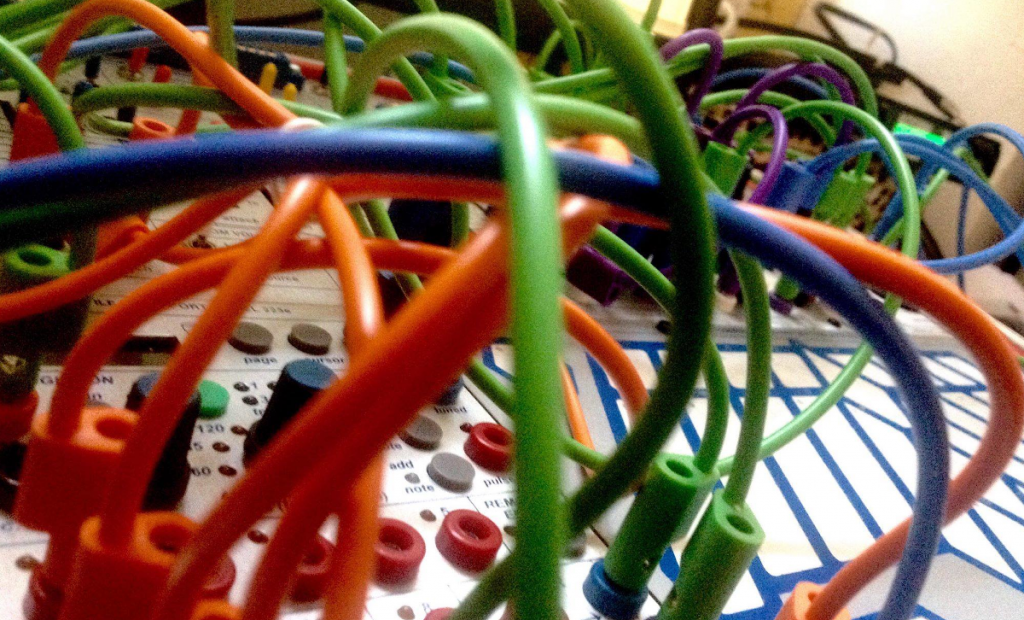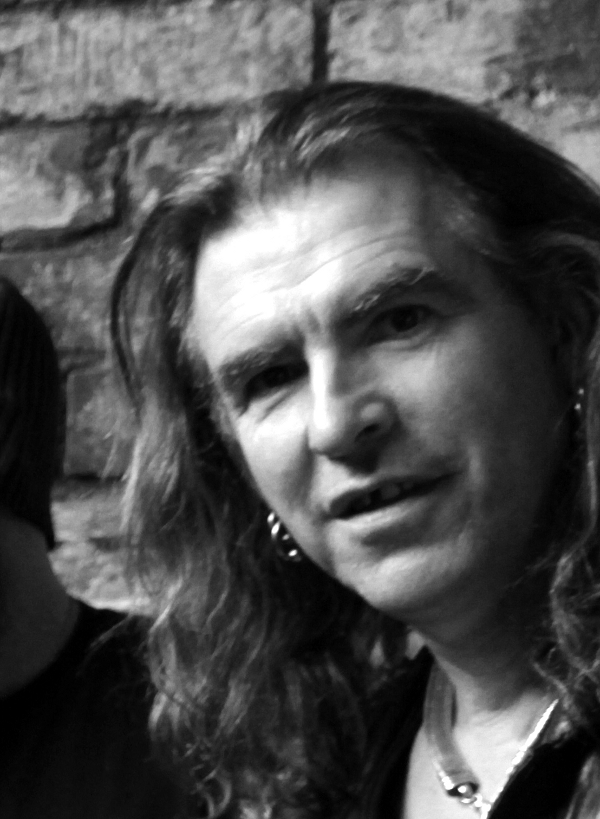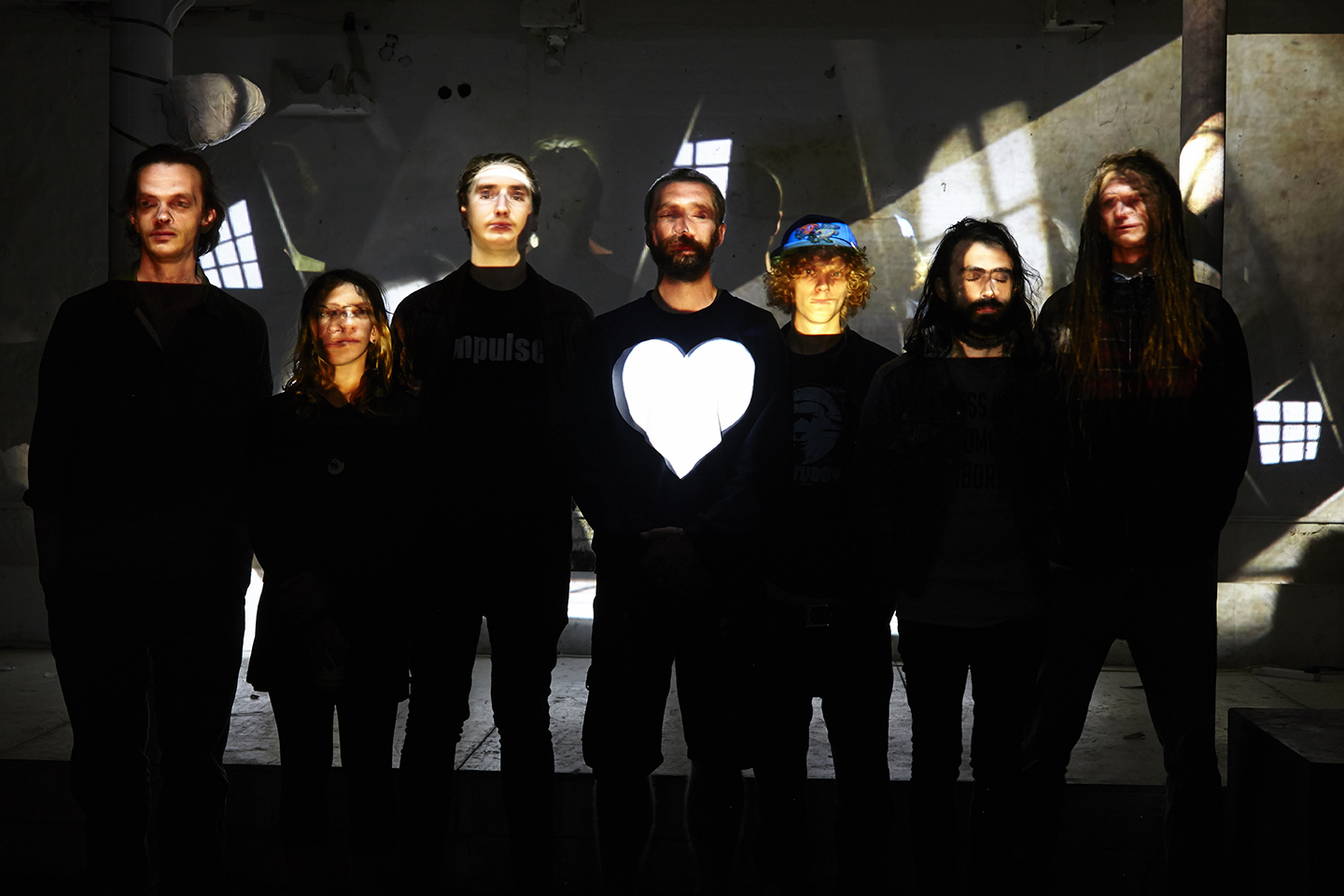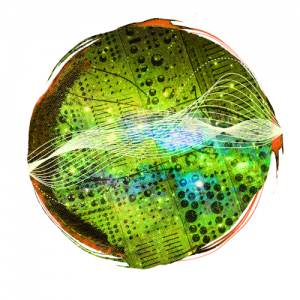 Turntablist, BiP_HOp and Pandemonium label owner, radio host and more, self-professed “musical travel-agent” Philippe Petit has been a tireless bastion of electronic and experimental music, having released more than fifty albums over the last decade alone, some featuring a cast of co-conspirators including Lydia Lunch, Edward Ka-Spel, James Johnston and Eugene S Robinson.
Turntablist, BiP_HOp and Pandemonium label owner, radio host and more, self-professed “musical travel-agent” Philippe Petit has been a tireless bastion of electronic and experimental music, having released more than fifty albums over the last decade alone, some featuring a cast of co-conspirators including Lydia Lunch, Edward Ka-Spel, James Johnston and Eugene S Robinson.
His latest venture is Modulisme, a platform / label / radio programme to promote modular synthesis, broadcast on air in France and Belgium and available online, each episode featuring a session from one renowned guest from this particular and ever-expanding area of electronic music.
Over the coming weeks and months, Freq will revisit these sessions as well as link to new ones as they arise, accompanied by exclusive interviews with the artists involved. Philippe opens the series with a special two-part session for Freq, and discusses his passion for all things modular and synthesised.
When did you first become aware of modular synthesis, and what did you think of it at the time?
In a way it has always been very influential, but sorta unconsciously, as I remember watching the essential Forbidden Planet movie on TV in the early ’70s and since then it has been my favorite sci-fi-fi movie. That soundtrack kept haunting me and I watched the movie every time it was screened until I managed to find that LP back in the early ’90s.That is when I became aware of the influence of the “electronic tonalities” created by Louis and Bebe Barron. Self-destructing modules, not the modulating, filtering, amplifying, oscillating et al technique that we use nowadays, but applying a stimulant. “It could be a voltage coming in from the outside, or it could be letting more current pass internally by changing a resistance, or by adjusting some kind of feedback.”
The method of control was always manual, and in fact this is what matters most to me when I play or compose. I feel like a craftsman sculpting sound, and I am interested in the musical gesture which may allow alternative ways of composing, of designing sounds, and of thinking about the relationships between music and technology.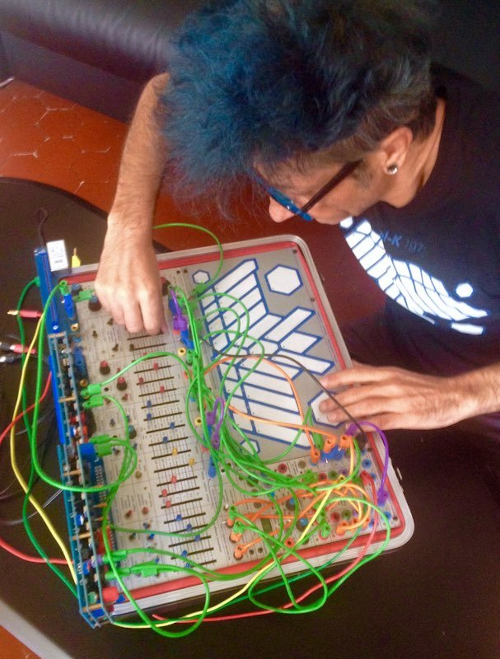 What was your first module or system?
What was your first module or system?
Although I had been using synthesizers for years, my first one is my Easel K from Buchla.
How long did it take for you to become accustomed to patching your own synthesizer together out of its component parts?
I am still learning and this is part of its beauty … Whereas one finds many tutorials, even a manual for the regular Easel, there is almost nothing on the Easel K; thus I have to find out for myself, and luckily Todd Barton has always been very kind providing replies when I was getting lost. One has to bear in mind that a modular instrument is complex; it may bring infinite possibilities, but one needs to rehearse the instrument fully. Imagine some musicians spending their full life practising their violin, and a proper system is far more complex and versatile than any acoustic instrument — so my quest is for life and I am happy with that idea.
Do you prefer single-maker systems (for example, Buchla, Make Noise, Erica Synths, Roland, etc) or making your own modular synthesizer out of individual components form whatever manufacturer that match your needs.
I like to work with systems that I can call instruments, from single manufacturers. I like the idea of one designer approaching it all. I like to keep my system small, work on it step by step, in order to really learn how to use certain modules in ways I wouldn’t if they were part of a bigger system.
East Coast, West Coast or No-Coast (as Make Noise put it)? Or is it all irrelevant?
Certainly, it all depends on everyone’s needs, tastes. It is important to know what you want, find your own sound and which tool-instrument may help you to get it; though obviously to know what is best for you, you may need to try them all — relevant but wrecking…
Do you tend to use pure modular systems, or do you bring in outside effect and devices when playing or recording?
Well, it depends on what I am trying to achieve; for instance for my session in Modulisme or the special one for Freq. I wanted to keep it visceral, done from scratch, on the spur of the moment… Intuitive improv.When I am composing I am trying to bring in some acoustics, as I like to mix the human and the machine, so I’d play my cymbalom, some prepared guitars, inside piano or invite some friends to record cello, electric harp, trumpet, etc, etc, according to what I may envision.
Do you find that you record straight with no overdubbing, or do you end up multi-tracking and editing tracks in post-production?
Same as above, live is in one take. Even for my albums I record in one take, like a kid discovering a toy. I like it intuitive, spontaneous; but then I may edit and would use multi-track sometimes. I like to think of two different approaches for my music: live to be experienced physically right in your face, once and never the same again. Then the studio is for trying to create music which hopefully listeners would want to return to so, I try to use some different hooks.Do you pre-patch your system when playing live, or do you tend to improvise on the spot?
I’d prepare a basic patch during soundcheck and move on from there up to something complex, or not… I like it not predictable.
Which module could you not do without, or which module do you you use the most in every patch?
Well, obviously I wouldn’t do without oscillators, then voltage controllers… filters, envelope generators, LFOs and a good dose of UFO as well… and a case, fuck yeah, never underestimate how important a case could be… It is like the spaceship. 🙂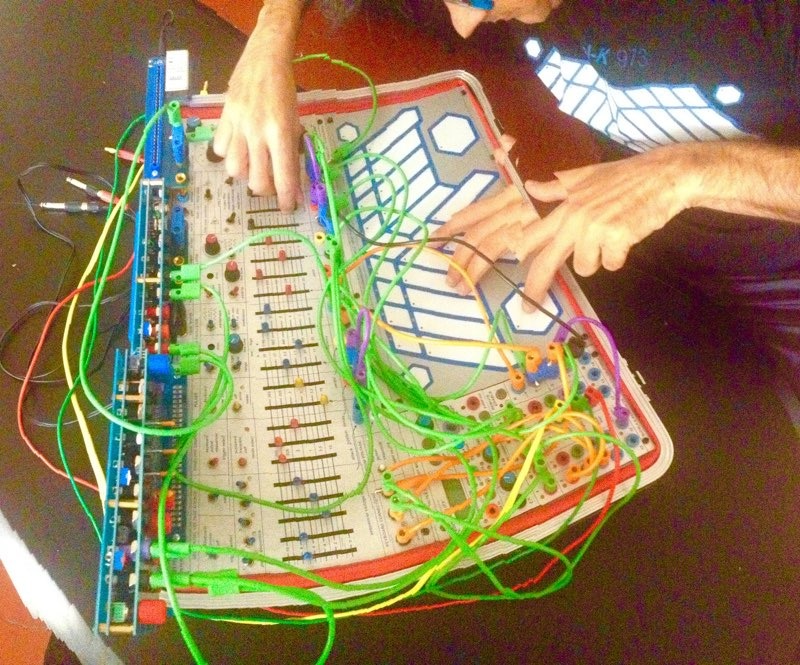 What do you think that can only be achieved by modular synthesis that other forms of electronic music cannot or make harder to do?
What do you think that can only be achieved by modular synthesis that other forms of electronic music cannot or make harder to do?
Remember Julie London had asked for it, and certainly musically “Flying To The Moon” could only be made using modular spaceships.
Have you used various forms of software modular (eg Reaktor Blocks, Softube, VCVRack) or digital hardware with modular editors (eg Nord Modular, Axoloti, Organelle), and if so what do you think of them?
Nope, dunno these guys.
What module or system you wish you had?
I’d love to drive a Serge or those bigger Buchla machines, that’s for sure.
Have you ever built a DIY module, or would you consider doing so?
You’re kidding me! I am not a handyman at all.
Which modular artist has influenced you the most in your own music?
There would be many, but for sure Morton Subotnick gave me an urge to acquire a Buchla, some works from Pierre Henry, the BBC Radiophonic Workshop — using the EMS Synthi made me drool over that unique machine.
Can you hear the sound of individual modules when listening to music now that you’ve entered into the modular world – how has it affected (or not) the way that you listen to music?
It certainly affected the way — or should I rather say how long — I spend listening to music on a daily basis. Before, I would spend hours listening to some other records, whereas now I am spending hours trying to find and sculpt a sound, a suite of sounds, how my modules interact together, et al. When not reading manuals… the life of a modular musician is really sexy. 🙂What have you been working on lately, and do you have any upcoming releases or performances?
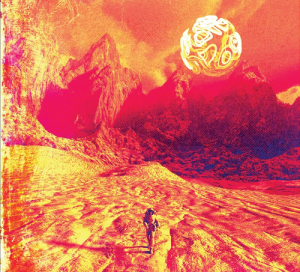 By the end of the year Opa-Loka will release my double CD in hommage to science-fiction, Do Humans Dream Of Electronic Ships, on which I have been very happy to merge acoustic with electricity using quite an instrumentarium: Buchla Easel, The Electric Music Box, Vox Continental organ, cymbalom, Moog modular System 55, electric psalterion, Moogerfooger MF 102 ring modulator, cello, ARP 2600, Moog Model 12, Theremin, grand piano, percussion, prepared vinyls / turntablisms, RSF expander, Kobol, Wurlitzer, Roland Fantom G6, guitar, Minimoog Model D, some processed voices / choir — and last but, not least some fingernail rubbings by Chantal Rouet.
By the end of the year Opa-Loka will release my double CD in hommage to science-fiction, Do Humans Dream Of Electronic Ships, on which I have been very happy to merge acoustic with electricity using quite an instrumentarium: Buchla Easel, The Electric Music Box, Vox Continental organ, cymbalom, Moog modular System 55, electric psalterion, Moogerfooger MF 102 ring modulator, cello, ARP 2600, Moog Model 12, Theremin, grand piano, percussion, prepared vinyls / turntablisms, RSF expander, Kobol, Wurlitzer, Roland Fantom G6, guitar, Minimoog Model D, some processed voices / choir — and last but, not least some fingernail rubbings by Chantal Rouet.
Can you outline how you patched and performed your Modulisme session?
I recorded it back in July, and all I can remember is that I started to improv playing my Buchla Easel K with its aux Card and sometimes thru the fuzz FX of the Eventide H9 pedal or a Moogerfooger ring modulator. “Assymetrical FreQ” was recorded yesterday using my GRP A4 synthesizer and Easel K going to EMS VCS3 Synthi.
Who would your dream guest be for Modulisme?
Morton Subotnick, but he already replied to me that even if he likes the idea “being in the wrong side of his 80s he can’t find time enough left to work on everything he’d like to”. And this would serve as a lesson to respect when approaching modular: stick to your priorities, to your needs and not fail in the capitalistic traps creating fake needs you can live without. Actually that should be a lesson for life ! Modular is life: quod erat demonstrandum !*
